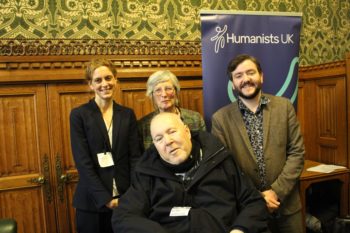
The High Court has rejected the application of severely disabled man Paul Lamb for permission to challenge the laws on assisted dying.
His application for permission to judicially review the assisted dying laws was heard at the High Court in London this afternoon by Lord Justice Dingemans and Mrs Justice Elisabeth Laing.
In reaching their judgment, they held that the design of a scheme is for Parliament and not the courts, the law is justified by the need to protect vulnerable people, and there is no right to commit suicide.
Paul can apply for permission to appeal the decision to the Court of Appeal and will now consider whether to do so.
Humanists UK Director of Public Affairs and Policy Richy Thompson said: ‘This is a hugely disappointing decision for Paul and all those who so desperately need a more humane and compassionate law that respects people’s human dignity and allows them to make their own end-of-life choices. However, the fight is not over as Paul has the option to appeal the decision if he chooses to. We will continue to support him in his efforts to reform the law.’
Rosa Curling, solicitor from Leigh Day representing Mr Lamb, said: ‘The refusal of permission is, of course, very disappointing for our client. He will now consider whether to apply for permission to appeal; he remains of the view that the current laws discriminate against him and those in his situation and must be reformed without further delay.’
Paul, 63 of Leeds, argues the current law – which prohibits any assistance under threat of up to fourteen years’ imprisonment – breaches his human rights, including Article 14 of the European Convention on Human Rights which protects against discrimination and Article 8 which protects the right to privacy and family life.
He argues the current laws are discriminatory against those with severe disabilities, because an able-bodied person would be able to end their own life if they wished, but the laws which make assisting suicide a criminal offence effectively prevent the severely disabled from doing so. Paul claims this puts severely disabled people at a disadvantage and the failure to make an exception for them is not justified.
In his application Paul claimed the recent dismissal of other right to die cases should have no bearing on his own, as his arguments are different from the others, for example those of Mr Newby and Mr Conway. Paul is not able to end his life through the removal of medical equipment or treatment. Paul is not seeking to restrict his proposed changes to those who have only six months to live and does not necessarily involve doctor-assisted suicide. Paul’s arguments centre on the legal issue of discrimination. The judges, however, disagreed.
Paul was severely injured in a car accident in 1990 and has no function below his neck apart from limited movement in his right arm. He requires around the clock care and knows that, given his condition, he will inevitably need assistance to die.
NOTES:
For further comment or information, please contact Humanists UK press manager Casey-Ann Seaniger at casey@humanists.uk or phone 020 7324 3078 or 07393 344293. Or contact Caroline Ivison Head of Media relations at Leigh Day at pressoffice@leighday.co.uk or 07775 713725.
Note to media: Paul is currently very unwell and, as a result, will be unable to attend the hearing or give any media interviews.
Read more about Humanists UK’s work on assisted dying.
Read more about Paul Lamb’s legal case.
Paul Lamb is represented by Rosa Curling and Erin Alcock of Leigh Day Solicitors, Philip Havers QC of 1 Crown Office, Adam Sandell of Matrix Chambers, Adam Straw of Doughty Street Chambers and Eesvan Krishnan of Blackstone Chambers. Ms Curling, Mr Havers, and Mr Sandell previously acted for the claimant known as ‘Martin’ during the 2014 Supreme Court case.
Humanists UK believes that individuals who are of sound mind but who are terminally ill or incurably suffering should have a right to decide to end their life at a time and in a manner of their choosing. We recognise that any assisted dying law must contain stringent safeguards, but the international evidence from countries where assisted dying is legal shows that safeguards can be effective.
Humanists UK is the national charity working on behalf of non-religious people. Powered by over 85,000 members and supporters, we advance free thinking and promote humanism to create a tolerant society where rational thinking and kindness prevail. We provide ceremonies, pastoral care, education, and support services benefitting over a million people every year and our campaigns advance humanist thinking on ethical issues, human rights, and equal treatment for all.
